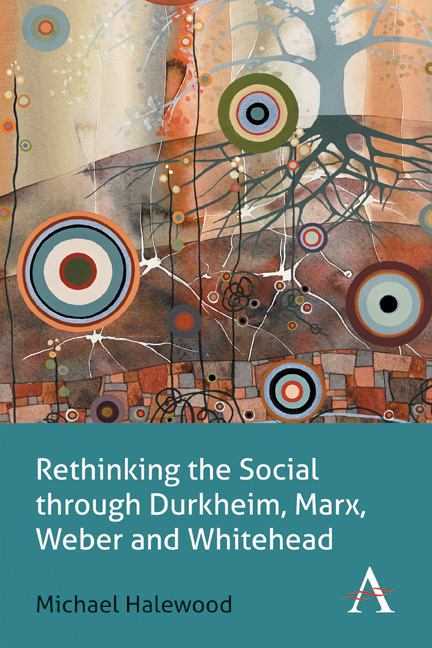Book contents
- Frontmatter
- CONTENTS
- Acknowledgements
- List of Abbreviations
- Chapter One Rethinking the Social
- Chapter Two Durkheim Approaches the Social
- Chapter Three Durkheim's Philosophy of the Social
- Chapter Four Marx on the Social and the Societal
- Chapter Five Weber's “Sozial” Action
- Chapter Six The Early Death of the Problem of the Social
- Chapter Seven Toward a Philosophy of the Social – Part One: Durkheim, Marx, Weber (and Simmel) Revisited
- Chapter Eight Toward a Philosophy of the Social – Part Two: Whitehead on Sociology, Societies and the Social
- Notes
- References
- Index
Chapter Six - The Early Death of the Problem of the Social
Published online by Cambridge University Press: 05 December 2015
- Frontmatter
- CONTENTS
- Acknowledgements
- List of Abbreviations
- Chapter One Rethinking the Social
- Chapter Two Durkheim Approaches the Social
- Chapter Three Durkheim's Philosophy of the Social
- Chapter Four Marx on the Social and the Societal
- Chapter Five Weber's “Sozial” Action
- Chapter Six The Early Death of the Problem of the Social
- Chapter Seven Toward a Philosophy of the Social – Part One: Durkheim, Marx, Weber (and Simmel) Revisited
- Chapter Eight Toward a Philosophy of the Social – Part Two: Whitehead on Sociology, Societies and the Social
- Notes
- References
- Index
Summary
Previous chapters have outlined the complex and sometimes inconsistent approaches that were developed around the concepts of the social and society in the texts of certain writers who are often seen as “foundational” for sociology; namely, Durkheim, Marx and Weber. I aimed to re-energize their arguments by outlining how each of these, in their own way, struggled and shifted position with regard to these concepts. All this has implications. One is to indicate that we social theorists and sociologists should be careful when we deploy the terms “social” or “society”. Furthermore, we should take care when critiquing or rejecting either term. For, not only might we dismiss something which we never fully grasped but we might also be ridding ourselves of important, if underdeveloped, lines of thought. In this chapter, I want to argue that in the later stages of the twentieth century, sociology and social theory witnessed what might be called “the death of the problem of the social”. This is different from talking of “the end of the social”. In the first chapter of this book, I outlined how Giddens (1984) was representative of such elisions. I made it clear that he was not “to blame” for this situation. I would now like to lay at least some of the blame at the feet of Talcott Parsons for what I have called the early death of the problem of the social.
For a few years now, I have been teaching classical and contemporary social theory to undergraduates at the University of Essex. As part of this, I ask my students to define sociology. It is remarkable, to my mind, that their definitions are so similar and all invoke the concepts of norms, values and social structure as being at the heart of what sociology studies and what the social world is. In their mode of argument there is a relentless reliance upon the terms deployed not by Durkheim, Marx or Weber, but by Parsons. Yet this is not something that they seem to recognize; they just seem to take it as obvious.
- Type
- Chapter
- Information
- Publisher: Anthem PressPrint publication year: 2014

